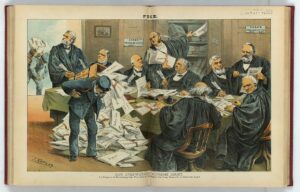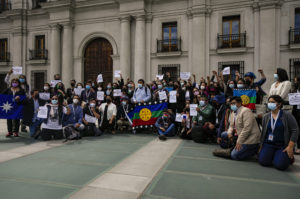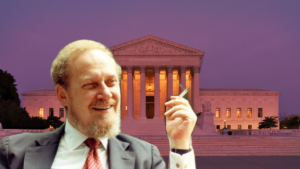Hypersensitive Cops Use Internet Stalking Law to Punish YouTube Meanie
A warrant is out on Mrfuddlesticks. Apparently the cops in Renton, Wash., can't take a joke, and that has put a constitutional right in jeopardy.
In Renton, Wash., chief city prosecutor Shawn Arthur has signed a search warrant demanding that Google Inc., owner of YouTube, reveal the real name of one “Mrfuddlesticks,” a YouTube poster who allegedly committed the crime of “cyberstalking.”
The problem is that Mrfuddlesticks has done nothing wrong. What he, or she, has done is exercise the constitutionally protected right to free speech. The alleged crime was making eight cartoon videos — political parodies — that were critical of the City of Renton Police Department. It should be pointed out that the cartoons never mention any of the complainants in the search warrant by name, and that the cyberstalking law was designed to protect children and the victims of real harassment — not overzealous police officers.
The cartoons allege or parody a wide spectrum of misbehavior ranging from drunkenness, to general incompetence, to sexual harassment, to improper sexual relationships with suspects, to stealing evidence. The videos are a bit rude — offensive even. And as an apparent result, a Renton police officer swore under oath that three of his colleagues had become the victims of the new crime of cyberstalking, because, according to the warrant, there was language in the videos that was “meant to embarrass and emotionally torment the victim[s] of the comments.”
Boohoo. Cry me a river.
Since when has it been illegal to make “comments” about police officers and other public employees? Well, if you believe the police, since March 24, 2004.
In 2004 the Washington Legislature enacted RCW 9.61.260, a law that states: “A person is guilty of cyberstalking if he or she, with intent to harass, intimidate, torment, or embarrass any other person, and under circumstances not constituting telephone harassment, makes an electronic communication to such other person or a third party … using any lewd, lascivious, indecent, or obscene words, images, or language, or suggesting the commission of any lewd or lascivious act.”
In other words, if you go online and “torment” or “embarrass” anyone with any “indecent” or “lewd” words, images or language, you could theoretically go to prison in the state of Washington.
As a lawyer, I am confident in asserting that this law clearly violates the United States Constitution. Indeed, most first-year law students could write an essay about why this law is unconstitutional — far too broad and vague to be enforceable, at least as applied to political speech.
But you don’t have to take my word for it. The eminent UCLA constitutional law professor Eugene Volokh wrote the following on his blog: “If the [Renton] prosecutor is right that the statute should be interpreted this broadly, then [the law is] clearly unconstitutionally overbroad. Speech to the public doesn’t lose its constitutional protection because it’s intended to torment or embarrass. … The statute would be clearly unconstitutional as applied to this video, and the prosecutor and the judge ought to know this.”
Further illustrating the absurdity of the law, especially as applied to political comedies, Volokh wrote: “A comedian’s joke that ‘lewd[ly]’ or ‘lascivious[ly]’ described President Clinton’s behavior with Monica Lewinsky, or for that matter Congressman Weiner’s behavior, would be a crime if it was made ‘with intent to … embarrass’ the President or the Congressman. The Hustler parody attacking Jerry Falwell, which the Supreme Court held to be protected against civil liability under the ‘intentional infliction of emotional distress tort,’ would be a crime.”
As Volokh suggests, maybe it’s not fair to blame just the police. The founders of our democracy were smart people, and they created a system of checks and balances designed to protect the American people from abuses of power.
Unfortunately, that system broke down, and there is plenty of blame to go around in Renton. The police, the prosecutor, the Legislature and even a local judge, James Cayce, all had to play along.
Unlike common citizens, these individuals are protected by the law and by their power. The prosecutor and the judge enjoy a special legal immunity for acts they commit as government employees. And the police are protected by the famous fraternal code — the outdated idea that police should stick together, no matter how wrong some of them sometimes are.
We can only hope that smarter and more patriotic public guardians will prevail in this case, and that some higher court will protect the person behind Mrfuddlesticks and his or her constitutional rights.
As the Supreme Court concluded in the Hustler case: “At the heart of the First Amendment is the recognition of the fundamental importance of the free flow of ideas and opinions on matters of public interest and concern. The freedom to speak one’s mind is not only an aspect of individual liberty — and thus a good unto itself — but also is essential to the common quest for truth and the vitality of society as a whole.”
Your support matters…Independent journalism is under threat and overshadowed by heavily funded mainstream media.
You can help level the playing field. Become a member.
Your tax-deductible contribution keeps us digging beneath the headlines to give you thought-provoking, investigative reporting and analysis that unearths what's really happening- without compromise.
Give today to support our courageous, independent journalists.






You need to be a supporter to comment.
There are currently no responses to this article.
Be the first to respond.